
Updated In 2024, From Podcast to MP3 Unveiling the Top Three Conversion Strategies

“From Podcast to MP3: Unveiling the Top Three Conversion Strategies”
Converting podcasts to MP3 is simpler than many of you think. Whether you’re looking to convert a podcast to MP3 to make it available for playing on your mobile device or share it with a friend, there are various ways to get the job done within a few clicks.
To help you out, we’ve explored different reliable methods that can come in handy to convert podcasts to MP3 without requiring technical knowledge. Keep reading to find out more!
Part 1. Can You Convert Podcast to mp3?
Yes, of course. Podcasts can be converted to MP3 by using either your podcast player, an online audio conversion tool, audio converter software, or iTunes.
Part 2. Why Should You Convert Podcast to mp3?
The main reason why you might need to convert podcasts to MP3 is that MP3 is a widely accepted format. Although some podcast player supports WAV formats, it’s advisable to keep your podcast file in MP3 so you won’t be castigated over your podcast’s audio format by listeners.
Part 3. How To Convert Podcast to mp3?
As mentioned earlier, you can convert podcasts to MP3 directly from a podcast player, using an online converter, or with iTunes.
Regardless of what method you choose to use, we’ve explained the simple steps to help you operate smoothly. Keep reading!
Way 1: Convert podcast to mp3 directly by podcast payers - Spotify
Some podcast apps like Spotify, Google Podcast, Apple Podcast, and many others allow users to directly download their favorite podcast episodes in MP3 format for offline listening. So, if you’re looking to convert podcast to MP3 without using an online or third-party tool, you can easily download it from the podcast app you’re using.
We’ve outlined the steps to convert a podcast to MP3 directly from a podcast player like Spotify podcast player below;
For Android & iOS
Step1 Open the Spotify app on your smartphone and locate the Podcast you want to convert to MP3. Then, tap on See All Episodes.
Step2 Tap the Download icon next to the podcast to save it as MP3 to your device.
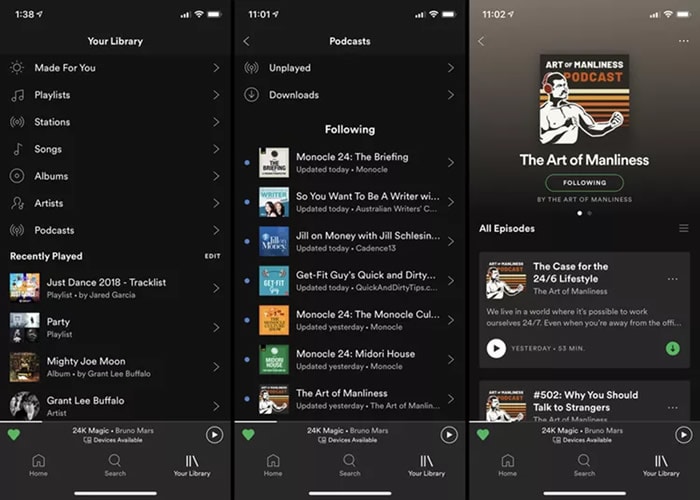
Step3 To find the downloaded podcast, go to Your Library > Podcasts. Then, select Downloads to see the podcast files.
For Computer
The process of converting podcasts to MP3 on Spotify via computer is similar to using a mobile device. You just need to do the following;
Step1 Open the Spotify app and login into your account.
Step2 Locate the Podcast that you wish to convert to MP3.
Step3 Move your cursor over the podcast episode you want to convert. Then, click the Download icon next to it to convert it to MP3.
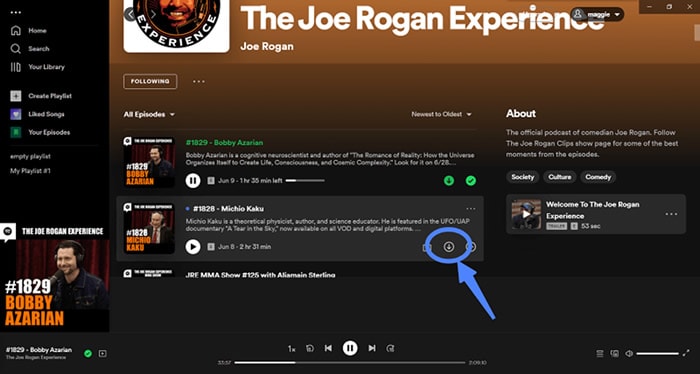
![]()
Note: You must have a premium Spotify account to be able to download podcasts.
Way 2: Convert podcasts to mp3 by online converters or converting software
If the Podcast you’re looking to convert to MP3 is not on a podcast manager, don’t panic. Tech experts have innovated various online tools that can also be used to convert podcasts to MP3s. So, if the Podcast you want to convert to MP3 is saved as a file on your device, you can employ a reliable online converter to execute the operation without compromising the quality of the Podcast.
We’ve curated a list of some online converters you can use below;
1. Convert Podcasts to MP3 with Uniconverter
Wondershare Uniconverter is a video/audio conversion tool that allows the conversion of files in various formats to another format without compromising the file’s quality. The tool is used by professionals to convert podcasts to MP3, as it boasts fast conversion speed and has a clean interface that makes it very easy to use.
Here is how to use Uniconverter to convert podcasts to MP3;
Step1 Install the Uniconverter software on your PC or macOS.
Step2 Click the Convert function from the top-left side. Then, use the Add Fies button at the top left corner of the screen to upload the podcast file that you’re looking to convert.
![]()
Step3 Click the drop-down icon next to Output Format. Then, select Audio > MP3 and choose the quality you want the output file to be.
![]()
Step4 Click File Location from the bottom left corner and select the path where you want the output file to be saved. Then, click Convert to start converting the podcast to MP3. This will take only a few minutes to complete.
![]()
Pros
- Convert unlimited podcasts to MP3 for free.
- Fast conversion speed.
- Supports batch conversion.
- It’s safe.
Cons
- It requires installation.
- You need to upgrade to premium to access all its features.
2. Convert Podcasts to MP3 Online with Media.io
The above method requires you to install a third-party app. But if you prefer using an online podcast converter, then Media.io is one of the best choices that’s worth trying. The tool allows you to quickly convert audio files into various formats safely and securely online.
Follow the following steps to use Media.io to convert your podcast;
Step1 Open theMedia.io Online Audio Converter tool on your browser and click Choose Files to upload the podcast file(s) you’re looking to convert. You can also upload the file from Google Drive, Dropbox, or via YouTube URL.

Step2 Click the drop-down icon next to To and select Audio. Then, choose MP3 as the preferred output format and click Convert to begin the conversion process.
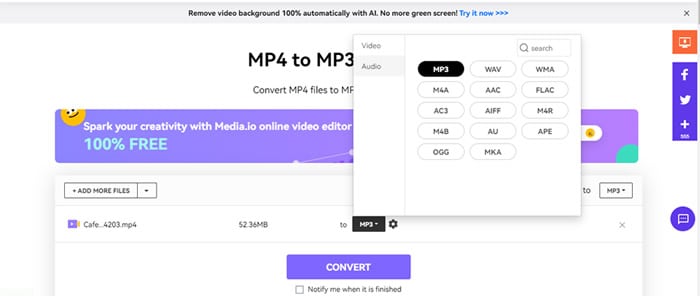
Step3 Once the file has been successfully converted to MP3, click the Download button to save it to your device’s local storage.
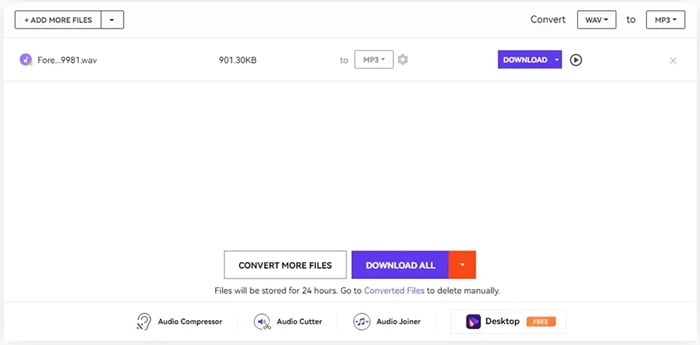
Pros
- It’s easy to operate.
- It’s safe and secure.
- No watermark.
- Fast conversion speed.
Cons
- It uploads files slowly.
3. Convert Podcast to MP3 With Online-Convert
If Media.io does not have what it takes to suit your requirements, Online-Convert is another excellent tool that can help you convert audio files from one format to another. Though it’s not 100% free like Media.io.
Here is how to use Online-Convert to convert podcast to MP3 online;
Step1 Open Online Convert online Audio to MP3 converter in your browser and click Choose File to upload the podcast file that you want to convert.

Step2 Click Start to begin the conversion.

Step3 Finally, click Download to save the converted file to your storage.

Pros
- Convert podcasts to MP3 without installing a third-party app.
- It’s easy to use.
- Supports simultaneous conversion of multiple podcast files.
Cons
- You must upgrade your account to be able to convert unlimited podcast files to MP3.
Way 3: Convert podcast to mp3 via iTunes
Besides music streaming, Apple iTunes also allows the conversion of audio files from one format to another. So, if you’ve got iTunes installed on your PC or Mac, you can easily employ it to convert the podcast to MP3. But this might not be a reliable option if you looking to convert many podcast episodes to MP3.
See the steps to convert podcast to MP3 with iTunes;
Step1 Open the iTunes app on your computer and click File from the top-left. Then, select Add File to Library to upload the podcast that you’re looking to convert.
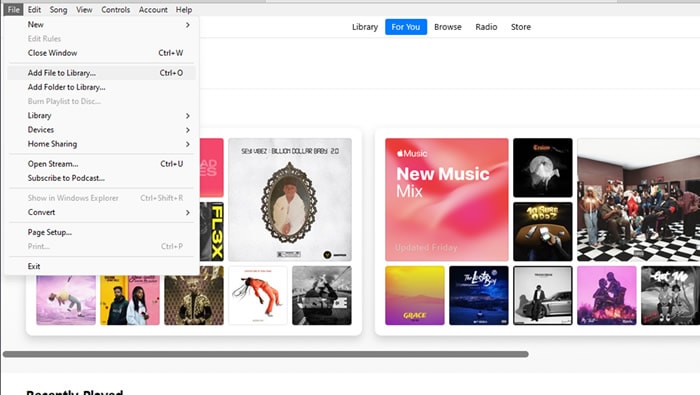
Step2 Once you upload the podcast, click Edit from the top bar. Then, select Preferences.
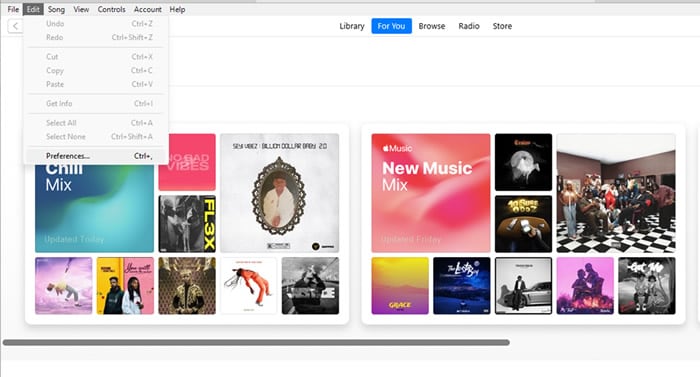
Step3 Click the General tab and select Import Settings.
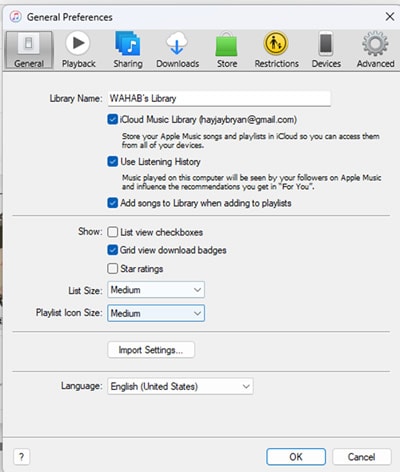
- Click the drop-down icon next to Import Using and select MP3 Encoder. Then, click OK.
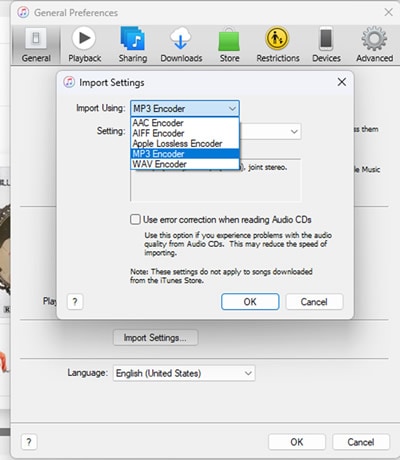
Step4 Click File from the top-left side once again. Then, select Convert > Create MP3 version.
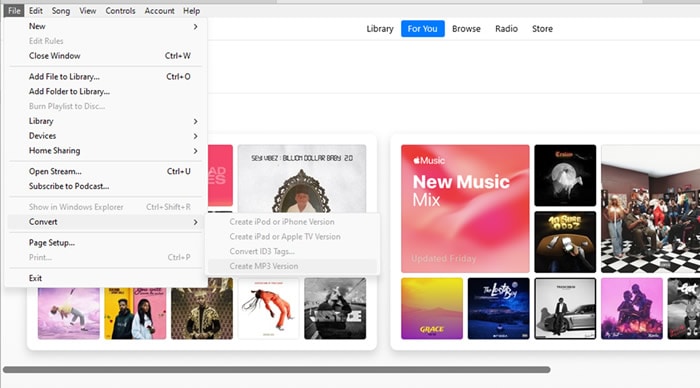
You’ve successfully converted the podcast to MP3!
Pros & Cons of using iTunes to Convert Podcasts to MP3
Pros
- It’s free.
- It’s easy to use.
- It does not reduce podcast quality.
Cons
- It’s not efficient for converting many podcast files.
Part 4. Tips & Tricks for Podcast to MP3 Conversion
- Convert Multiple Podcast Files Simultaneously: If you have a bunch of podcasts to convert to MP3, it’s advisable to use online tools or software like the ones mentioned in the article above to convert all of them at once. It saves you from unwanted stress and wasting your time.
- Add Podcasts to “My Favorites” or “Save to My Library: Add all podcasts you wish to convert to “My Favorites” or save them to your library so you can easily locate them.
- Ensure to have a stable internet connection when using an online tool: Make sure you have a stable internet connection when using online audio converters to convert podcasts to MP3. It makes the process smooth and straightforward.
Final Words
The above techniques are efficient for converting podcasts to MP3. As you can see, it does not matter whether you’re looking to use a podcast manager app like Spotify, online converter, software, or iTunes, the steps are very easy to employ.
Overall, make sure you read the pros and cons attached to using each method so you can choose the one that suits your requirements.
Way 2: Convert podcasts to mp3 by online converters or converting software
If the Podcast you’re looking to convert to MP3 is not on a podcast manager, don’t panic. Tech experts have innovated various online tools that can also be used to convert podcasts to MP3s. So, if the Podcast you want to convert to MP3 is saved as a file on your device, you can employ a reliable online converter to execute the operation without compromising the quality of the Podcast.
We’ve curated a list of some online converters you can use below;
1. Convert Podcasts to MP3 with Uniconverter
Wondershare Uniconverter is a video/audio conversion tool that allows the conversion of files in various formats to another format without compromising the file’s quality. The tool is used by professionals to convert podcasts to MP3, as it boasts fast conversion speed and has a clean interface that makes it very easy to use.
Here is how to use Uniconverter to convert podcasts to MP3;
Step1 Install the Uniconverter software on your PC or macOS.
Step2 Click the Convert function from the top-left side. Then, use the Add Fies button at the top left corner of the screen to upload the podcast file that you’re looking to convert.
![]()
Step3 Click the drop-down icon next to Output Format. Then, select Audio > MP3 and choose the quality you want the output file to be.
![]()
Step4 Click File Location from the bottom left corner and select the path where you want the output file to be saved. Then, click Convert to start converting the podcast to MP3. This will take only a few minutes to complete.
![]()
Pros
- Convert unlimited podcasts to MP3 for free.
- Fast conversion speed.
- Supports batch conversion.
- It’s safe.
Cons
- It requires installation.
- You need to upgrade to premium to access all its features.
2. Convert Podcasts to MP3 Online with Media.io
The above method requires you to install a third-party app. But if you prefer using an online podcast converter, then Media.io is one of the best choices that’s worth trying. The tool allows you to quickly convert audio files into various formats safely and securely online.
Follow the following steps to use Media.io to convert your podcast;
Step1 Open theMedia.io Online Audio Converter tool on your browser and click Choose Files to upload the podcast file(s) you’re looking to convert. You can also upload the file from Google Drive, Dropbox, or via YouTube URL.

Step2 Click the drop-down icon next to To and select Audio. Then, choose MP3 as the preferred output format and click Convert to begin the conversion process.

Step3 Once the file has been successfully converted to MP3, click the Download button to save it to your device’s local storage.

Pros
- It’s easy to operate.
- It’s safe and secure.
- No watermark.
- Fast conversion speed.
Cons
- It uploads files slowly.
3. Convert Podcast to MP3 With Online-Convert
If Media.io does not have what it takes to suit your requirements, Online-Convert is another excellent tool that can help you convert audio files from one format to another. Though it’s not 100% free like Media.io.
Here is how to use Online-Convert to convert podcast to MP3 online;
Step1 Open Online Convert online Audio to MP3 converter in your browser and click Choose File to upload the podcast file that you want to convert.

Step2 Click Start to begin the conversion.

Step3 Finally, click Download to save the converted file to your storage.

Pros
- Convert podcasts to MP3 without installing a third-party app.
- It’s easy to use.
- Supports simultaneous conversion of multiple podcast files.
Cons
- You must upgrade your account to be able to convert unlimited podcast files to MP3.
Way 3: Convert podcast to mp3 via iTunes
Besides music streaming, Apple iTunes also allows the conversion of audio files from one format to another. So, if you’ve got iTunes installed on your PC or Mac, you can easily employ it to convert the podcast to MP3. But this might not be a reliable option if you looking to convert many podcast episodes to MP3.
See the steps to convert podcast to MP3 with iTunes;
Step1 Open the iTunes app on your computer and click File from the top-left. Then, select Add File to Library to upload the podcast that you’re looking to convert.

Step2 Once you upload the podcast, click Edit from the top bar. Then, select Preferences.

Step3 Click the General tab and select Import Settings.

- Click the drop-down icon next to Import Using and select MP3 Encoder. Then, click OK.

Step4 Click File from the top-left side once again. Then, select Convert > Create MP3 version.

You’ve successfully converted the podcast to MP3!
Pros & Cons of using iTunes to Convert Podcasts to MP3
Pros
- It’s free.
- It’s easy to use.
- It does not reduce podcast quality.
Cons
- It’s not efficient for converting many podcast files.
Part 4. Tips & Tricks for Podcast to MP3 Conversion
- Convert Multiple Podcast Files Simultaneously: If you have a bunch of podcasts to convert to MP3, it’s advisable to use online tools or software like the ones mentioned in the article above to convert all of them at once. It saves you from unwanted stress and wasting your time.
- Add Podcasts to “My Favorites” or “Save to My Library: Add all podcasts you wish to convert to “My Favorites” or save them to your library so you can easily locate them.
- Ensure to have a stable internet connection when using an online tool: Make sure you have a stable internet connection when using online audio converters to convert podcasts to MP3. It makes the process smooth and straightforward.
Final Words
The above techniques are efficient for converting podcasts to MP3. As you can see, it does not matter whether you’re looking to use a podcast manager app like Spotify, online converter, software, or iTunes, the steps are very easy to employ.
Overall, make sure you read the pros and cons attached to using each method so you can choose the one that suits your requirements.
Learn the Free Techniques to Mute Audio in Windows 10 Videos
You might need to remove sound from video windows 10. However, you may be confused about which tools you should you. Indeed, plenty of video editing tools have complicated user interfaces, which is not good if you are a beginner. Fortunately, in this article, we will recommend some of the reliable tools you can use to remove audio from video windows 10—additionally, a simple guide on how to do it.
Method 1: Use online and free solutions to mute audio in videos (500 words)
1. Kapwing
Kapwing is an easy-to-use but powerful online tool for remove sound from video windows 10. Furthermore, Kapwing has many different features you can use for all sorts of things. Such as making videos, adding subtitles to videos, filtering videos, adding watermarks to videos, and many more.
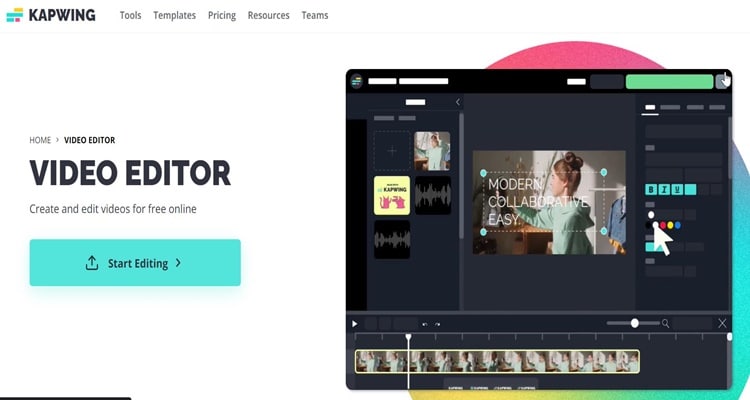
How to mute audio in videos with Kapwing
Step1 To begin, launch your web browser and search the website Kapwing.com. After that, select “Tool” from the menu.
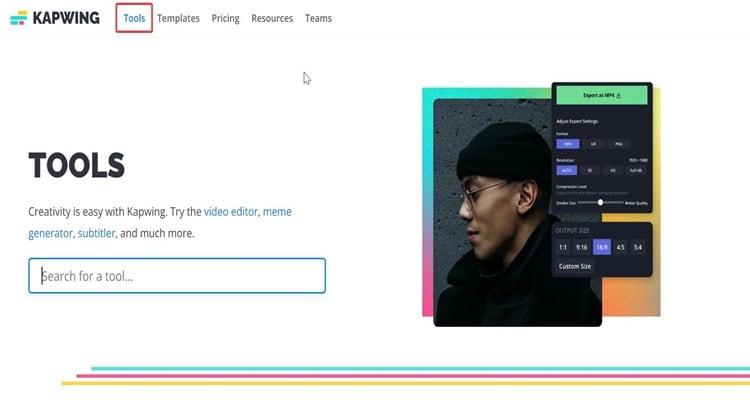
Step2 in the search bar, type “Mute video” and click on it when the mute video feature pops up.
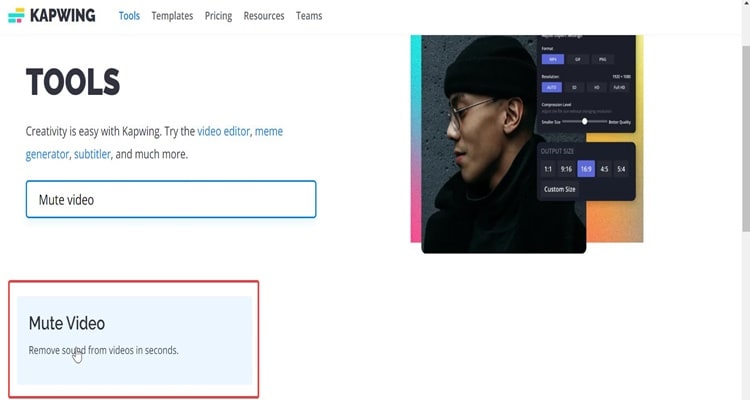
Step3 Click “upload video” in the next window to add the video you want to mute.
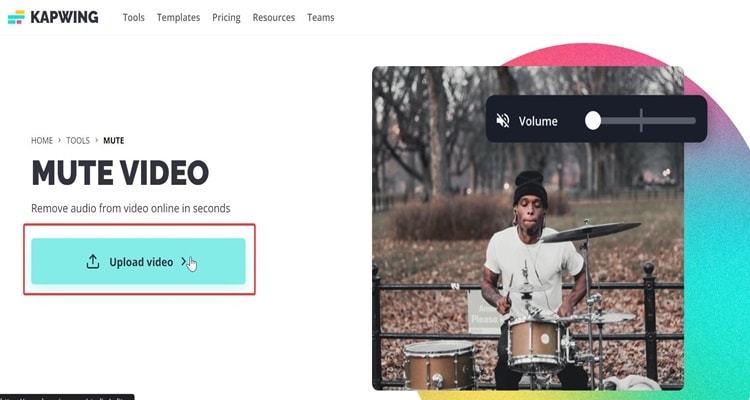
Step4 Once you upload your video, click your video, and you will see the volume feature. You just need to drag the volume to the most left to mute the audio.
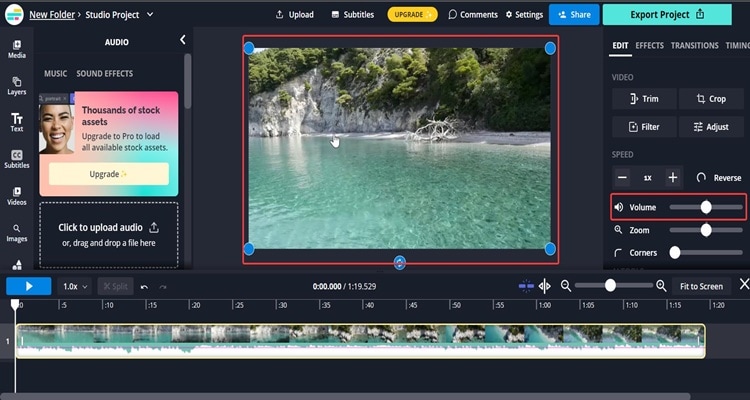
Step5 Once you mute the movie audio, click “Export project.”
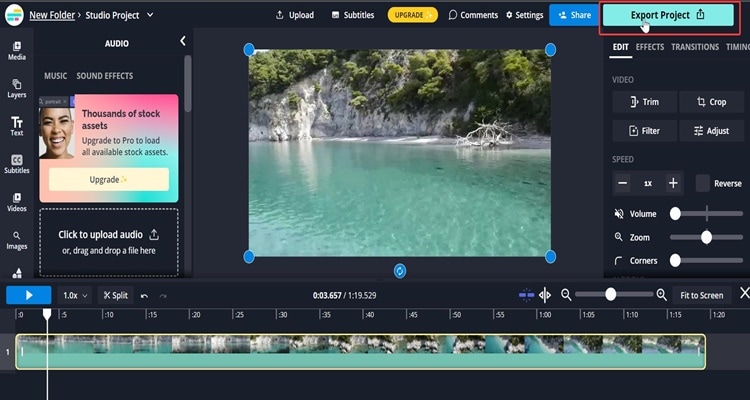
Step6 When the exporting project is done, you can save your video on your computer by clicking “download file.”
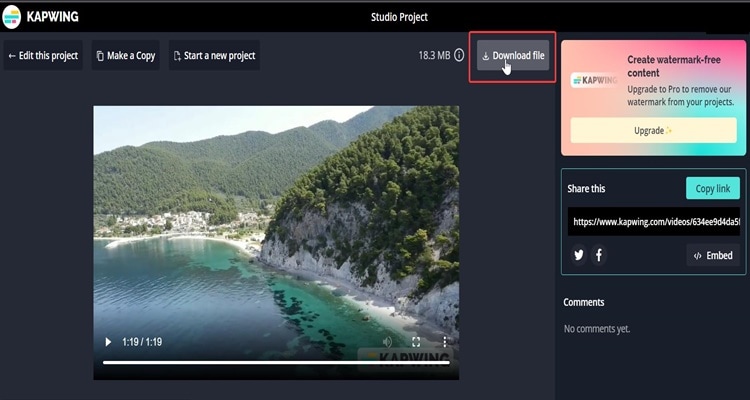
2. Veed.io
VEED is a windows video editor remove audio that makes it easy to remove the sound from a video. You can mute the whole video or just a part of it. There’s no software to install. You can do it right in your browser. VEED, on the other hand, is free and very simple to use.
How to remove mute audio from video with VEED.io
Step1 Open your browser and type “Remove audio mute VEED” into the search bar. After that, click “Choose video” to import the video you want to mute.
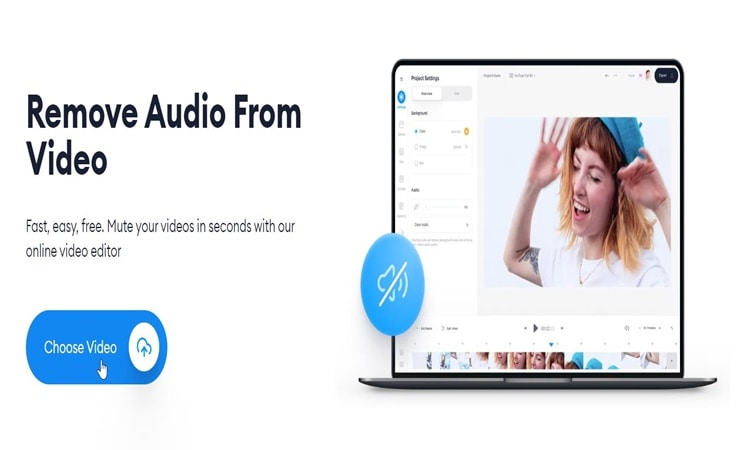
Step2 When you’re on the editing page, you’ll see a sound icon. Click that, and then drag the sound bar down to remove the sound. Once you remove the sound, click “Export” in the top right of your screen.
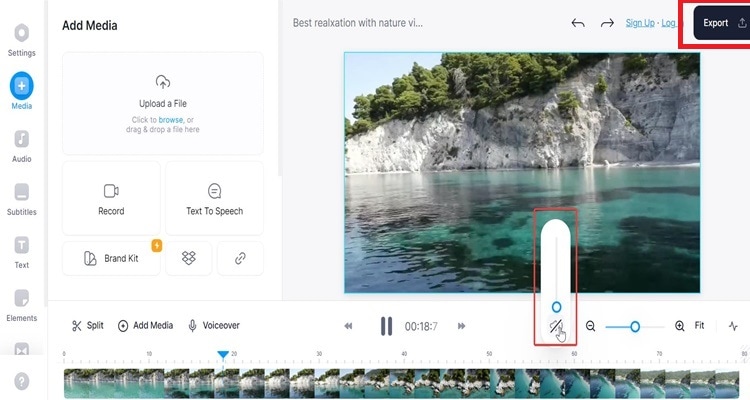
Step3 When the video exporting process is done, you can save the video you edited on your computer by clicking “Download.”

3. Adobe Express
Adobe Express is another tool for remove audio from video windows. You can use to remove sound from your videos. has an easy-to-use interface that makes removing sound in a video only a few steps.

How to remove audio from the video with Adobe Express
Step1 Open your browser and search for “Remove audio with Adobe Express”. In the next window, click “Upload your video” to import your video.
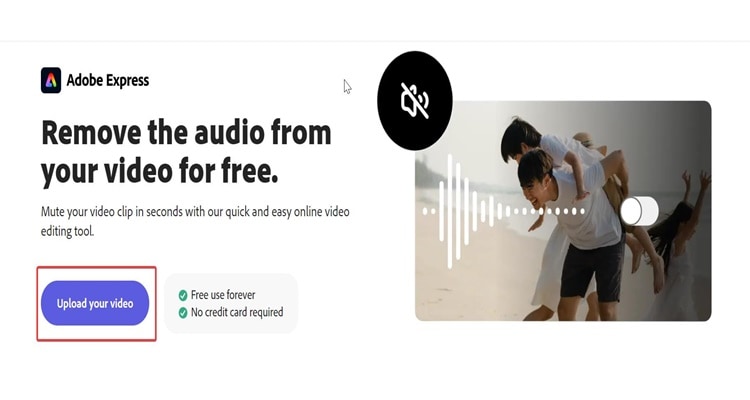
Step2 On the next page, you will see your video, and you will see the option “Mute” press that button to remove the sound on your video. Once you remove the audio from your video, click “download” to save your video.
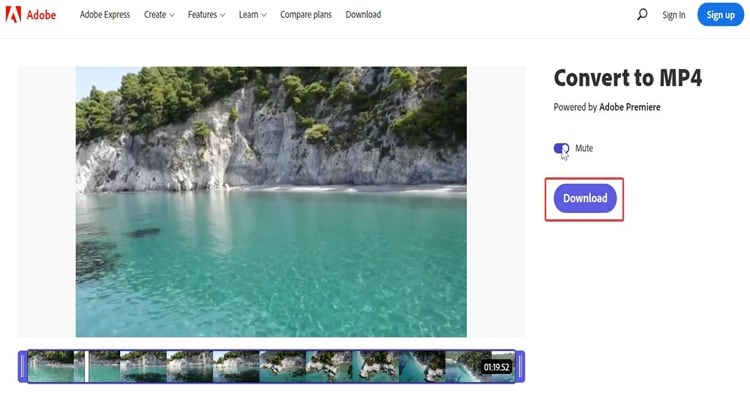
Method 2: Use Filmora to remove audio from video
Step1 Before going any further, you need to download Filmora and open it on your computer. When you’re done, click “new project.”
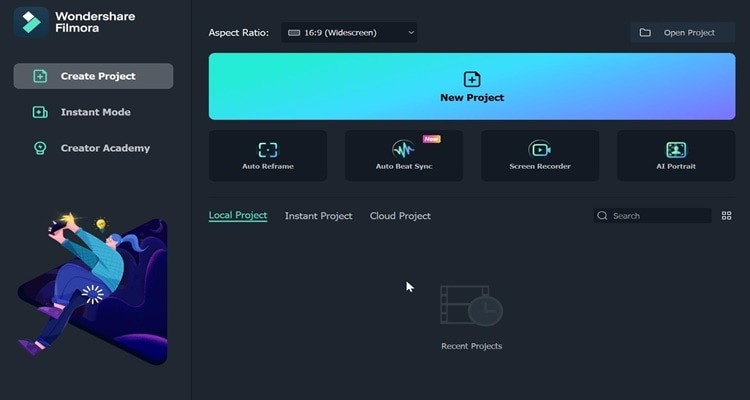
Free Download For Win 7 or later(64-bit)
Free Download For macOS 10.14 or later
Step2 In this step, you need to find the video you want to mute on your computer and import it to Filmora. Then, drag your video onto Filmora’s timeline.
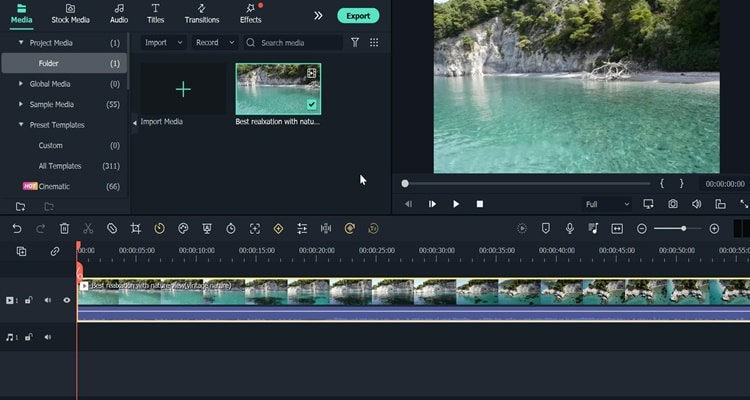
Step3 Once you’ve dragged your video onto Filmora’s timeline, click on your video in the timeline and then right-click. Afterwards, choose “detach audio.”
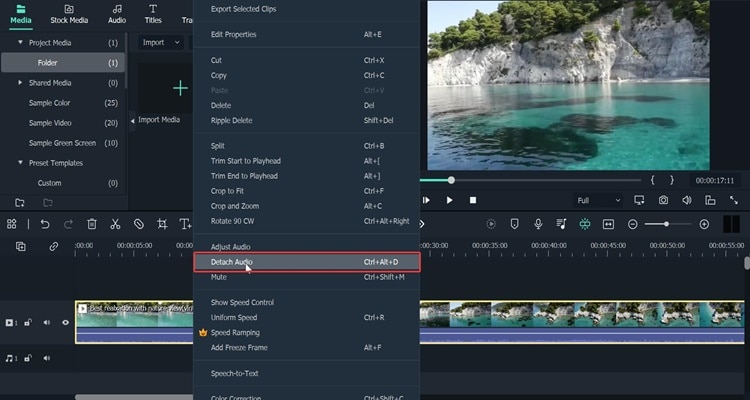
Step4 Now, you will see the audio track below the video track. Simply, click on the audio track and click the “delete” icon. Finally, you are successful in muting the audio from your video.
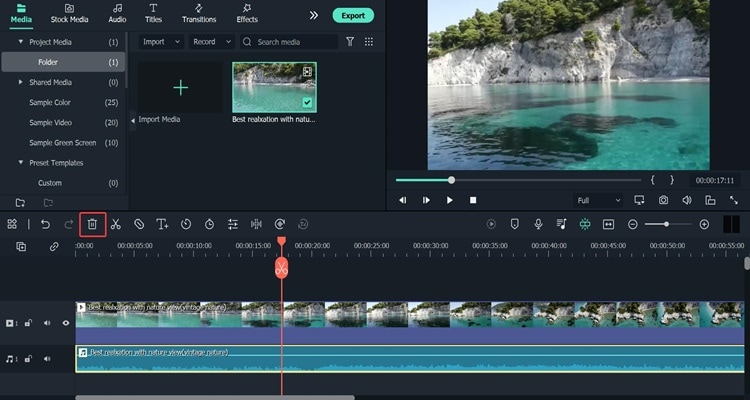
Step5 Click “Export” to save your video on your computer.
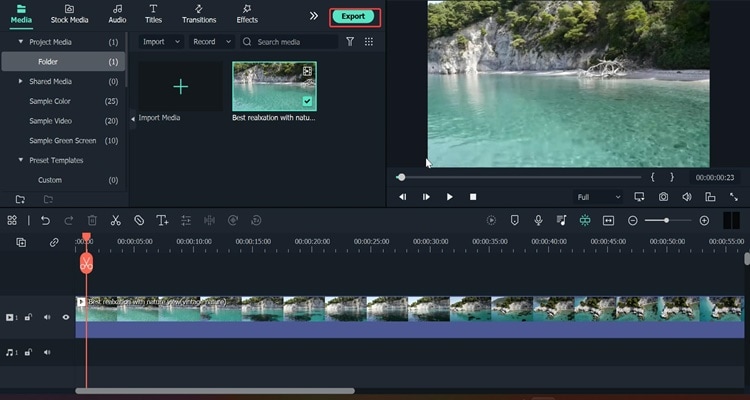
Beside Filmora allow you to mute audio from entire of the video, Filmora also has another audio modify feature called “Silence detection”. Silence Detection is a special add-on for Filmora users, making it easier to cut out silent parts of a video. Silence Detection is a unique Filmora add-on that makes it easier for users to remove silent pauses from a film. The add-on examines the full video to detect all the silent pauses and eliminates them instantly, saving you time and simplifying the editing process.
How to use silence detection?
Step1 Right-click on the clip in the resource, select the video clip on the timeline, and choose the silence detection option to open up the silence detection window.
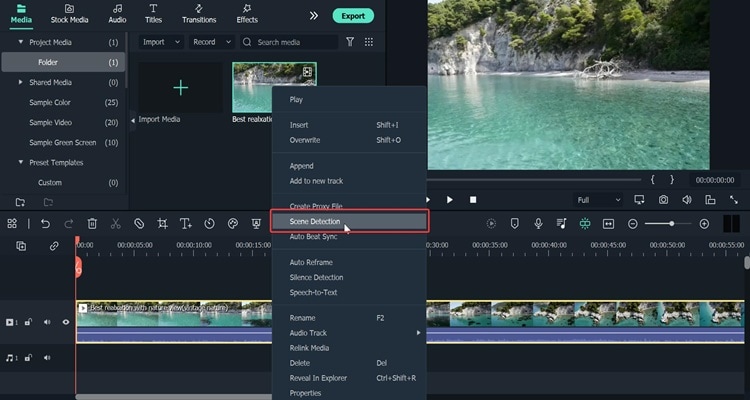
Step2 The silent detection tool will automatically detect the silent and low sound points.
Furthermore, you can adjust the parameters to recalculate the silence detection or manually fine-tune what the feature has already detected
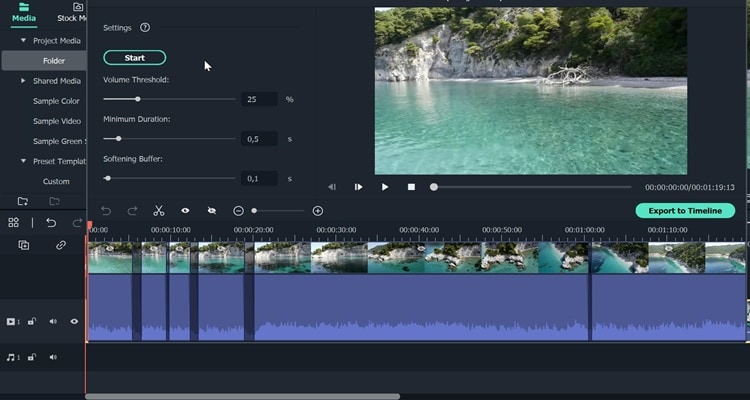
once everything sounds good, export the video into the Filmora timeline so you can continue editing your video.
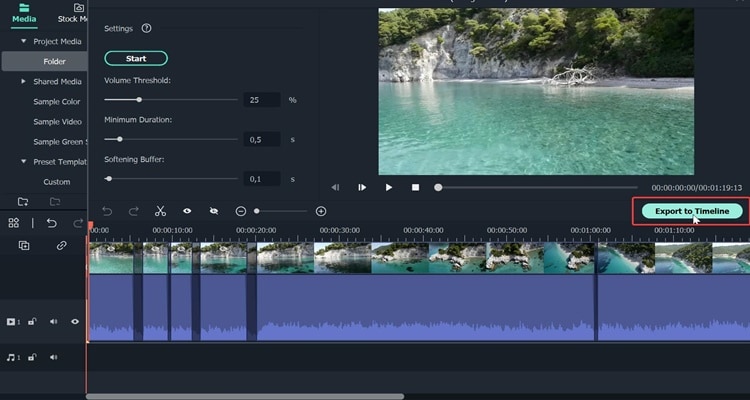
Moreover, Filmora also has another feature called “Audio ducking”. Audio ducking is a way to turn down the volume of the background when one voiceover comes on.
How to use audio ducking with Filmora
Step1 Let’s say you already have your voiceover and the audio in your video. If you want you to use duking voice feature, firstly, you need to decide which part of the audio you want to lower. After that, double-click the selected part until the ducking voice feature comes out.
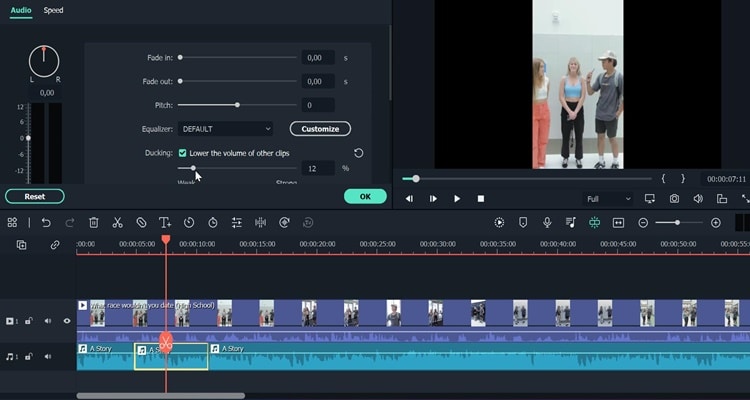
Step2 Next, you just need to drag the audio ducking bar to the left or right. Indeed, if you drag to the right, it will lower the audio. Once you are done adjusting the audio, click “Ok”, and you can preview the result.
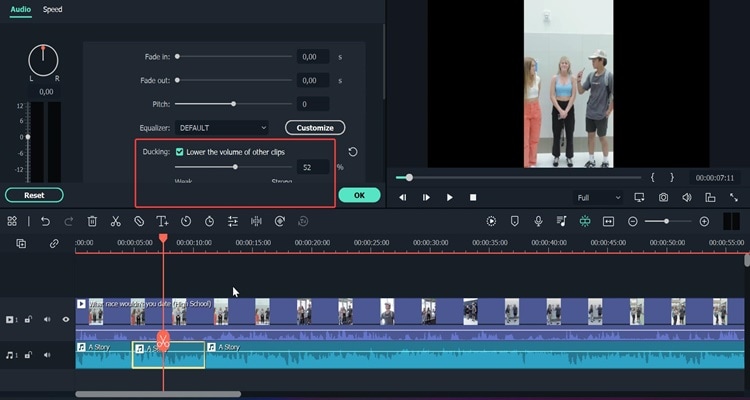
Last but not least, Filmora has other features called TTS and STT. Speech to Text (STT) allows you to transcript voice to subtitles in one click. Using speech-to-text will save you a lot of time on subtitling and speed up the editing process. Meanwhile, Text to Speech (TTS) is a feature in Filmora that lets you turn text files into voiceover and add more elements to your video.
How to use STT with Filmora
Step1 Firstly, right-click on the audio track and choose “Speech-to-Text”.
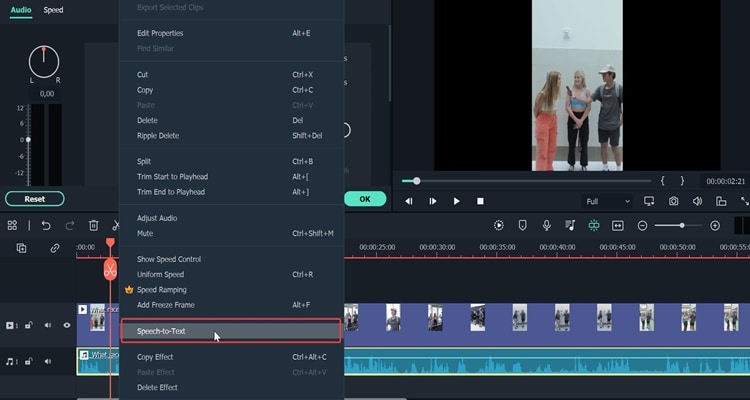
Step2 In the STT parameter setting bar, you can choose the language of the audio to be transcribed and the files to be converted. You can also choose to match automatically to the timeline.
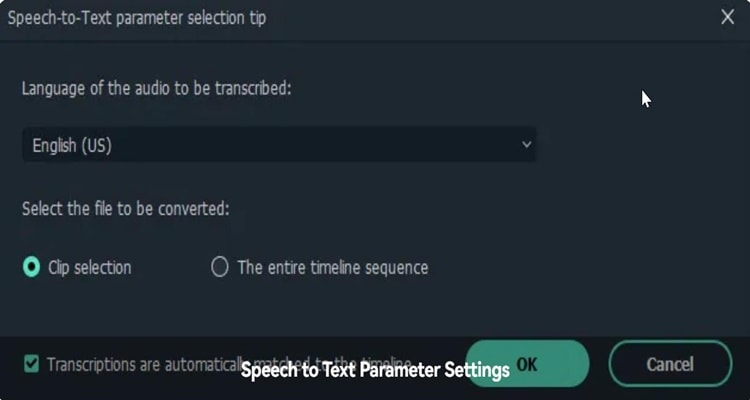
How to use TTS with Filmore
Step1 Go to the “Tittle” and add you default Title. After that, write anything you want.
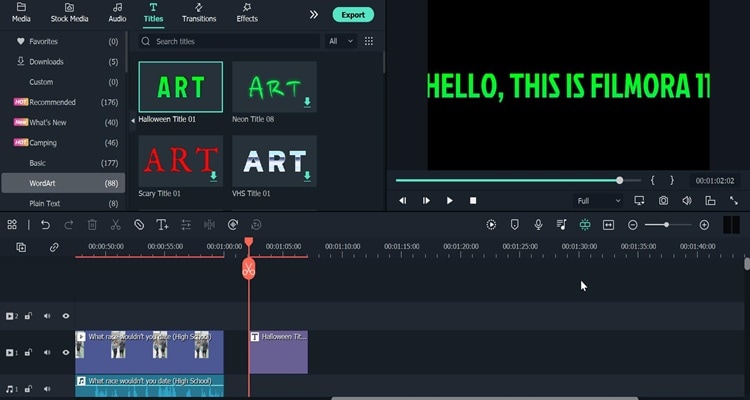
Step2 Select the title box in the timeline, then right-click. After that, click on “Text-to-Speech”.
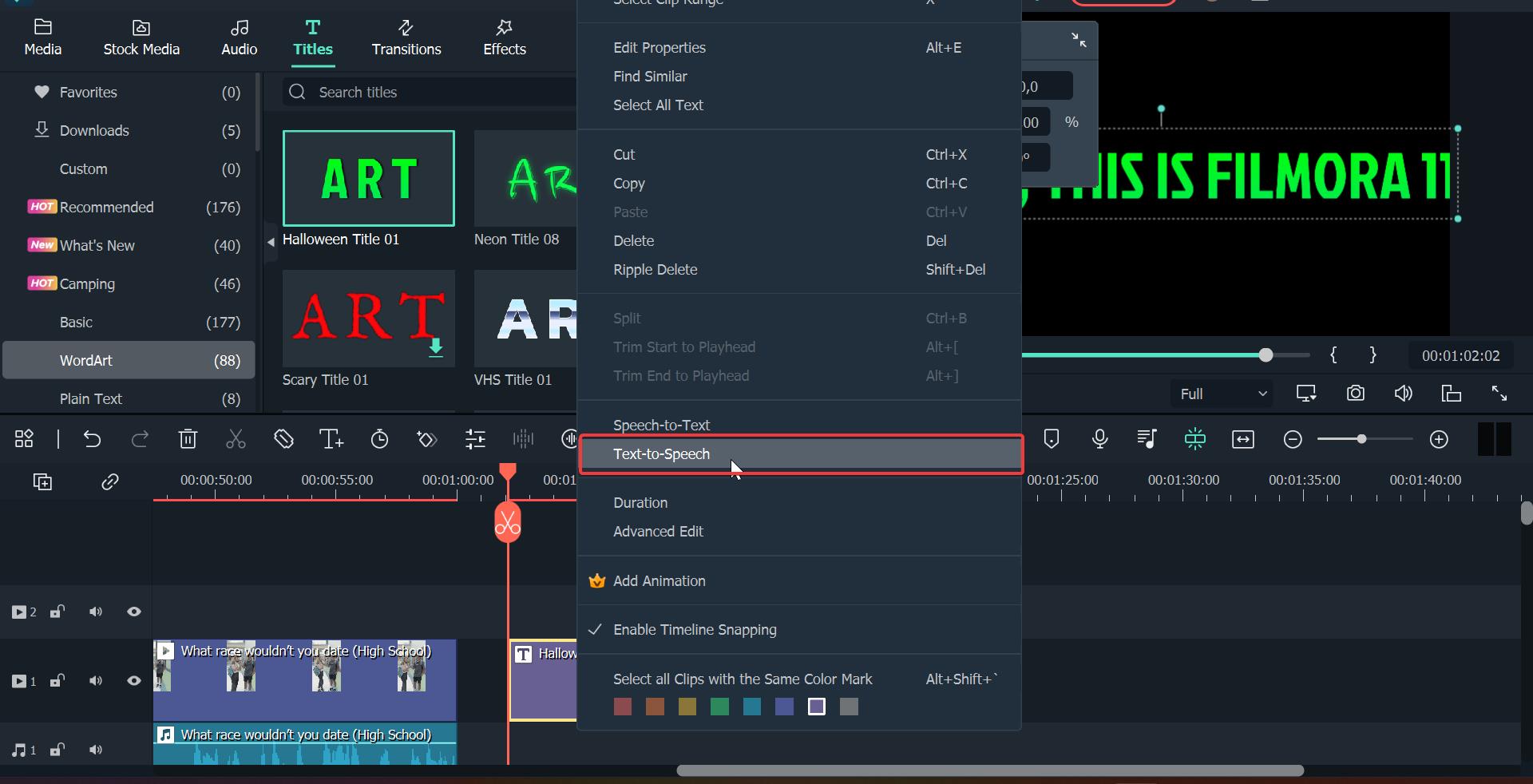
Step3 In the TTS parameter setting bar, choose the language this title is in and the voice’s name.
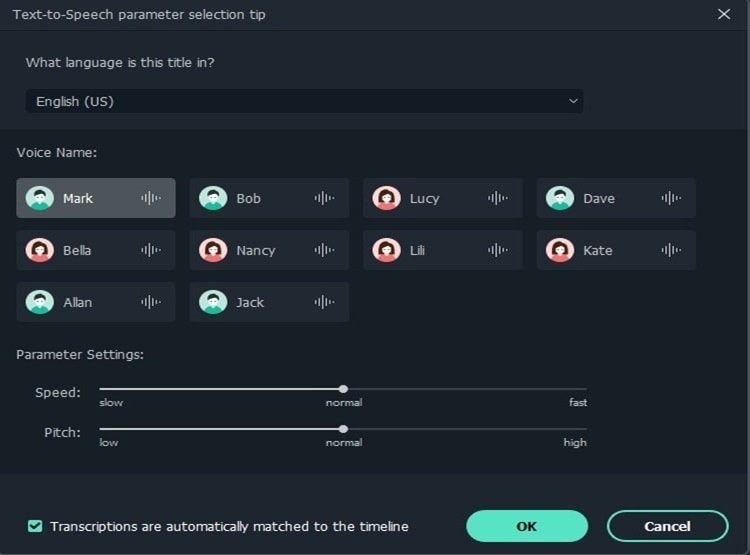
Method 3: Use Windows 10 officially recommend video editor
1. Climpchamp
Clipchamp is an online video editor that makes it easy for anyone to make videos, even if they have never edited before. It lets you combine your videos, images, and audio files, remove audio from the video and then save the finished video to your computer. On the Climpchamp homepage, you can sign up for a free account and start editing your videos right away.

How to mute audio from the video with Climpchamp
Step1 First, open up your browser and search for Climpchamp.com. You must sign up and make an account on the next page first. Please note that creating an account doesn’t cost anything. Once you have an account, you just need to click “Create your first video”.
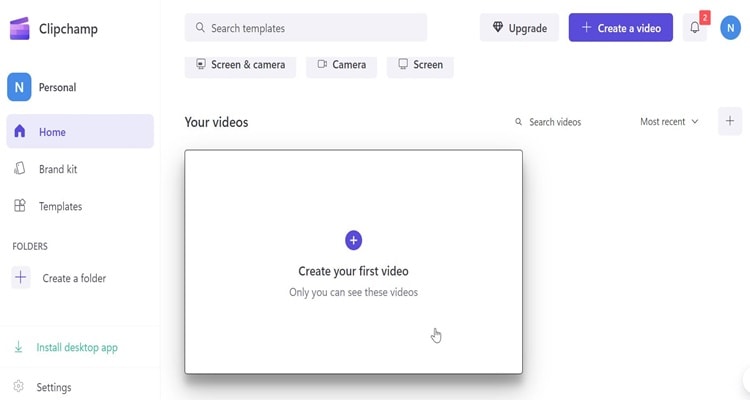
Step2 In this part, you just need to drag the video file you want to mute into the Clipchamp.
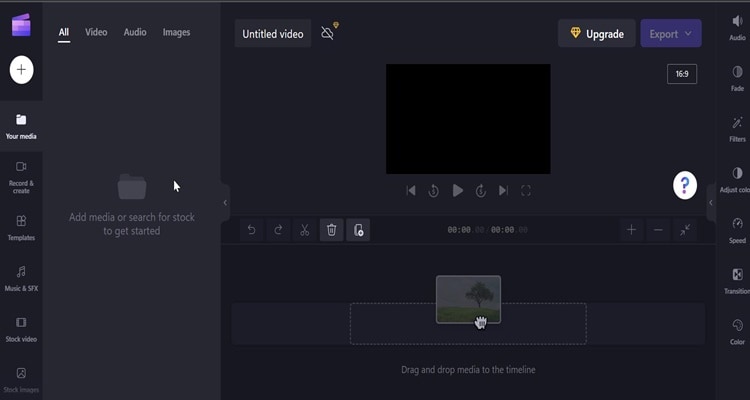
Step3 Once you import your video into Clipchamp. Then, go to “Audio” and simply drag the bar to the most left to remove the audio. When you are done, click “Export” on your top screen.
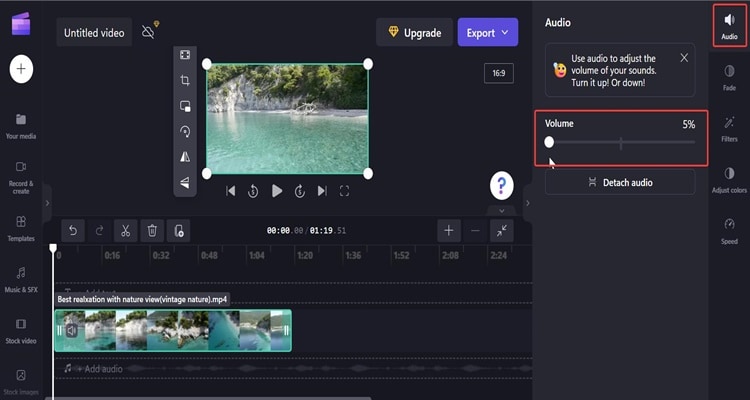
Step4 When exporting the video is done, click “Save to your computer” to save the video.
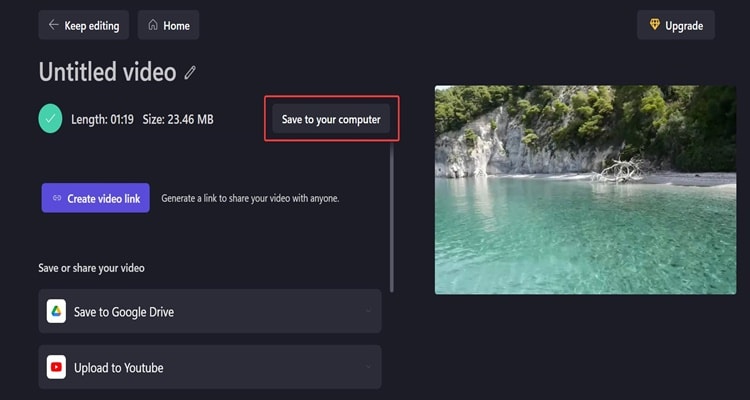
Part4: FAQ
Why do we need to mute audio from the video?
Getting rid of the audio from some clips might be necessary for a variety of reasons: perhaps the background noise is too loud, maybe you want to censor something from it, or maybe you simply don’t need it because you plan to use the video as B-roll or play music over it.
Conclusion
Basically, it’s easy to remove sound from video windows 10. You can use the tools mentioned above and follow the step-by-step instructions on how to do it. Out of all the tools listed above, Filmora is the best one to use. Filmora can not only take the sound out of your video but also has many ways to change the sound. Like ducking video or detaching audio
Free Download For macOS 10.14 or later
Step2 In this step, you need to find the video you want to mute on your computer and import it to Filmora. Then, drag your video onto Filmora’s timeline.

Step3 Once you’ve dragged your video onto Filmora’s timeline, click on your video in the timeline and then right-click. Afterwards, choose “detach audio.”

Step4 Now, you will see the audio track below the video track. Simply, click on the audio track and click the “delete” icon. Finally, you are successful in muting the audio from your video.

Step5 Click “Export” to save your video on your computer.

Beside Filmora allow you to mute audio from entire of the video, Filmora also has another audio modify feature called “Silence detection”. Silence Detection is a special add-on for Filmora users, making it easier to cut out silent parts of a video. Silence Detection is a unique Filmora add-on that makes it easier for users to remove silent pauses from a film. The add-on examines the full video to detect all the silent pauses and eliminates them instantly, saving you time and simplifying the editing process.
How to use silence detection?
Step1 Right-click on the clip in the resource, select the video clip on the timeline, and choose the silence detection option to open up the silence detection window.

Step2 The silent detection tool will automatically detect the silent and low sound points.
Furthermore, you can adjust the parameters to recalculate the silence detection or manually fine-tune what the feature has already detected

once everything sounds good, export the video into the Filmora timeline so you can continue editing your video.

Moreover, Filmora also has another feature called “Audio ducking”. Audio ducking is a way to turn down the volume of the background when one voiceover comes on.
How to use audio ducking with Filmora
Step1 Let’s say you already have your voiceover and the audio in your video. If you want you to use duking voice feature, firstly, you need to decide which part of the audio you want to lower. After that, double-click the selected part until the ducking voice feature comes out.

Step2 Next, you just need to drag the audio ducking bar to the left or right. Indeed, if you drag to the right, it will lower the audio. Once you are done adjusting the audio, click “Ok”, and you can preview the result.

Last but not least, Filmora has other features called TTS and STT. Speech to Text (STT) allows you to transcript voice to subtitles in one click. Using speech-to-text will save you a lot of time on subtitling and speed up the editing process. Meanwhile, Text to Speech (TTS) is a feature in Filmora that lets you turn text files into voiceover and add more elements to your video.
How to use STT with Filmora
Step1 Firstly, right-click on the audio track and choose “Speech-to-Text”.

Step2 In the STT parameter setting bar, you can choose the language of the audio to be transcribed and the files to be converted. You can also choose to match automatically to the timeline.

How to use TTS with Filmore
Step1 Go to the “Tittle” and add you default Title. After that, write anything you want.

Step2 Select the title box in the timeline, then right-click. After that, click on “Text-to-Speech”.

Step3 In the TTS parameter setting bar, choose the language this title is in and the voice’s name.

Method 3: Use Windows 10 officially recommend video editor
1. Climpchamp
Clipchamp is an online video editor that makes it easy for anyone to make videos, even if they have never edited before. It lets you combine your videos, images, and audio files, remove audio from the video and then save the finished video to your computer. On the Climpchamp homepage, you can sign up for a free account and start editing your videos right away.

How to mute audio from the video with Climpchamp
Step1 First, open up your browser and search for Climpchamp.com. You must sign up and make an account on the next page first. Please note that creating an account doesn’t cost anything. Once you have an account, you just need to click “Create your first video”.

Step2 In this part, you just need to drag the video file you want to mute into the Clipchamp.

Step3 Once you import your video into Clipchamp. Then, go to “Audio” and simply drag the bar to the most left to remove the audio. When you are done, click “Export” on your top screen.

Step4 When exporting the video is done, click “Save to your computer” to save the video.

Part4: FAQ
Why do we need to mute audio from the video?
Getting rid of the audio from some clips might be necessary for a variety of reasons: perhaps the background noise is too loud, maybe you want to censor something from it, or maybe you simply don’t need it because you plan to use the video as B-roll or play music over it.
Conclusion
Basically, it’s easy to remove sound from video windows 10. You can use the tools mentioned above and follow the step-by-step instructions on how to do it. Out of all the tools listed above, Filmora is the best one to use. Filmora can not only take the sound out of your video but also has many ways to change the sound. Like ducking video or detaching audio
Ultimate Rankings: Proven Platforms for Accurate MP3 Track Labeling
Do you like songs? Generally, people love and enjoy listening to songs because it relaxes them. Some people work with music, some study with music, whereas some go to the gym and sweat on the beats. The question is, do you just enjoy the music or do you get proper knowledge about it?
ID3 tags are the metadata in MP3 files which contain information regarding the content like its title, artist, album, genre, and other things. In case you want to change the tags, you can take help from the online MP3 tag editors. Let us discuss the 5 best tag editors that could be used.
Part 1. 5 Best Online MP3 Tag Editor Websites That You Can’t Miss
There are two types of music lovers, one who just listens to enjoy. Whereas others like to collect music and maintain a tag library. MP3 files have metadata, and this consists of information regarding the music file other than its name. Do you know the MP3 tag is the best business? Let’s talk more about it and share 5 great music tag editors online.
1. TagMP3.net
TagMP3.net is a free website for changing music tags, album arts, and other ID3 as well. With this website, you don’t have to download or install any software or application to change the ID3 tags of your MP3 files. A cool thing about TagMP3.net is that it can be accessed from any platform regardless of the device being used. You only need a strong internet connection to use the online editor.
This online automatic MP3 tag editor updates the ID3 version to ID3v2 for the MP3 files. This editor comes with a very easy and user-friendly interface, and you don’t need much assistance to use it. With TagMP3.net, you can easily upload the audio file from your hard drive, or else for uploading a file from an online database, enter its URL.
How to Use TagMP3.net?
Step 1: Start by searching and opening the TagMP3.net editing tool on your browser. Then you have to upload the files for that, hit the ‘Choose Files’ button and add the file. Or else, you can also copy-paste the URL or drag and drop the file.

Step 2: Now, the music tag editor online will spontaneously add the metadata found on the internet. You can then check and verify the added information and make changes if required.

Step 3: After all the data is finalized, you can tap on the ‘Generate New File’ button. As soon as you do this, you are redirected to the ‘Download’ page. At this point, download the copy of the audio file that contains the correct metadata.

2. MP3Repair
MP3Repair is an online MP3 tag editor with many other diverse features. Apart from editing MP3 tags, the tool could also be used for repairing online audio lengths and playtimes, cutting MP3 files and removing advertising, etc.
MP3Repair is a freeware, online editor that allows both repair and edit of MP3 files uploaded from your device or else from an online database. This online tool has a clean and understandable interface that users can work with easily.
Guideline to Use MP3Repair
Step 1: Open the web browser on your device and search for MP3Repair, then open its official webpage to start the work. After that, upload the MP3 file by pasting the URL to get the file from an online database. Or, hit the big ‘Upload’ button to add files from your device.

Step 2: After the file has been added, tap on the ‘Upload MP3 File’ button. Now, among the provided options, select the ‘Edit ID3 Tags’ option. All the detailed information will appear on the screen; from here, edit the metadata and tap on the ‘Repair/Edit your MP3 File Now!’ option.

Step 3: Lastly, when the repaired MP3 file is displayed on the screen, hit the ‘Download your new MP3 File’ button. This will automatically download the MP3 file with the edited ID3 tags.

3. Watermark Images
Looking for a tool to add metadata? Let’s talk about Watermark Images. This online tool is free to use for unlimited time. You can add metadata to any of your files like images, audio, etc. The best part about using Watermark Images music tag editor online is that it offers an active customer service help center.
Moreover, this online freeware tool supports you to add or change the album artwork. This easy-to-use tool has no requirements to download anything on your machine; you just need good internet connectivity.
Follow these Steps to Use Watermark Image MP3 Tag Editor
Step 1: To use Watermark Images online MP3 tag editor; first of all, browse for its official webpage. As soon as it opens, hit the ‘Select MP3 File’ button and select your preferred file to add metadata; it takes a few seconds to upload the file.

Step 2: Next to the ‘MP3 output settings’ section, you will see a long list of empty fields asking for genre names, artists, etc. Here, search for all the asked questions and then enter them in the empty fields. After that, tap on the ‘Process MP3’ button below the details to add the information in the MP3 file.

Step 3: At the end, click on the ‘Download File’ button. This will insert all the metadata and information regarding the audio file, and lastly, a link will be shared to download the final file.

4. MP3 ID3 Tag Editor
Are you a beginner? Try MP3 ID3 Tag Editor for adding and editing tags in your MP3 files. This tool is very useful and simple because of its easy interface. Your audio files can be edited like compressing, album title, album artist, genre, etc.
With MP3 ID3 Tag Editor, you can either add or also change the album art. Moreover, the online automatic MP3 tag editor extends support to auto-fill bags. The best thing, save your files to Google Drive or your computer with this tag editor.
Use MP3 ID3 Tag Editor by Following these Steps
Step 1: For editing the metadata in any MP3 file, start by opening the webpage of the tag editor. Next, you have to upload the file, for that either import file from the available cloud storages options. Or else, tap on the ‘Choose Files’ option to browse the file from your device.

Step 2: As soon as you have uploaded the file, the screen will display different options and various fields. You should fill out the form and update the metadata.

Step 3: After all the amendments are made in the metadata, tap on the ‘Save Tags’ option to save the file to your computer or Google Drive.

5. NeatMP3
If we talk about another nice tag editor, then, NeatMP3 is on the list. This online tool provides you with complete assistance, and you simply have to search for the metadata and fill in the correct spaces. This online automatic MP3 tag editor has a free version, and a premium version is also available. Are you ready to know about the most amazing thing? The offline version of this tool comes with a built-in media player.
Learn From Us to Use NeatMP3
Step 1: To edit the tags, first of all, search for the official website of ‘NeatMP3’ on any browser on your computer. Next, for uploading the MP3 file, tap on the ‘Choose File’ option from the webpage.

Step 2: We have mentioned this earlier; this online MP3 tag editor does not automatically fill the metadata. Users have to fill out the form after searching for the information manually. After filling out the information, tap on the ‘Write Tags’ button and download the MP3 file.

Last Words
Was the above article helpful? Like we said earlier, we will introduce the 5 best online MP3 tag editors, so we did that. We hope that the article has shared a sufficient level of detail to increase your knowledge. Talking about increasing your knowledge, let’s also introduce a great video editor.
We are talking about Wondershare Filmora . This editor offers a wide variety of tools and diverse features. You can edit videos, audio, and a lot more than that. Features like Split Screen, Stabilize Video, AI Portrait, etc., are not a big deal for Filmora.
Apart from advanced features, you can also get your hands-on basic editing features like trim, cut, split, merge, join, etc.
For Win 7 or later (64-bit)
For macOS 10.12 or later
For macOS 10.12 or later
For macOS 10.12 or later
For macOS 10.12 or later
Also read:
- [New] In 2024, Proven Methods to Prevent Photos App Freezes in Windows 10
- [Updated] 2024 Approved Finding Your Preferred Video Editor Filmora Vs. Democreator Insights
- Detailed Assessment and Review of the High-Definition Logitech C92n Camera for Video Conferencing
- Enhancing Scholarly Research: Top 5 Innovative Approaches Using AI Tools
- Get Your Hands on iOS 18.1 Beta with Enhanced AI Features - Join Now! | CNET
- How to Successfully Deploy and Configure Auto-GPT in Your Ubuntu Environment
- In 2024, How to Send and Fake Live Location on Facebook Messenger Of your Nubia Red Magic 9 Pro+ | Dr.fone
- New 2024 Approved A Symphony in One Merging Audio Files for a Unified Videography Narrative
- New 2024 Approved Top Picks for High-Quality Outdoor Audio Archives
- New A Detailed Breakdown Cambridge Audios CXU System Review for 2024
- New In 2024, Audacity Tutorial Boost or Mute Your Sound Effectively
- New In 2024, Decoding the Best Software to Perform Audio Time-Reversal A Curated Selection for Desktop, Phone, and Tablet Users
- New In 2024, Unlock the Potential of Your Videos with Our Comprehensive List of Best Free Converters (Online/Offline)
- Overcoming BSOD in Windows 11 - Irql Error
- Soundscape Inversion Masterclass Identifying the Premium Audio Reversers Available Today
- Tom's Tech Hub: Dive Into the Latest Computer Components
- Top 7 Sonic Alterations Mastering the Art of Digital Audio Transformation for 2024
- Title: Updated In 2024, From Podcast to MP3 Unveiling the Top Three Conversion Strategies
- Author: David
- Created at : 2024-10-02 01:21:32
- Updated at : 2024-10-05 16:48:54
- Link: https://sound-tweaking.techidaily.com/updated-in-2024-from-podcast-to-mp3-unveiling-the-top-three-conversion-strategies/
- License: This work is licensed under CC BY-NC-SA 4.0.